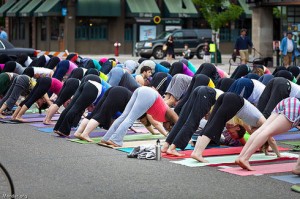Open the Streets
Cities Thrive by Going Footloose and Car-Free
by Jay Walljasper
Imagine diverting traffic from a major street in your neighborhood, then welcoming families on bikes, families on foot, babies in  strollers, people in wheelchairs, toddlers on training wheels, grade schoolers on skateboards, teenagers on single-speeds, hipsters on fixed gears, grandparents on recumbents, couples arm-in-arm and even yoga classes in the middle of the road. What would happen?
strollers, people in wheelchairs, toddlers on training wheels, grade schoolers on skateboards, teenagers on single-speeds, hipsters on fixed gears, grandparents on recumbents, couples arm-in-arm and even yoga classes in the middle of the road. What would happen?
If your neighborhood is anything like mine — which I am sure it is — get ready for a massive outbreak of smiles.
A few Sundays ago, Minneapolis debuted its first “Open Streets Ciclovia†by closing busy Lyndale Avenue for 2.3 miles south of downtown between 10 a.m. and 2 p.m. Despite relentlessly overcast skies, an estimated 5000-7000 people hit the street to walk, bike, look, talk, giggle, dance, eat, and thoroughly enjoy themselves.
A band at the south end of the route played up-tempo hymns on the lawn of Bethlehem Lutheran Church while the north end featured a DJ blasting pop hits. The Cadillac Kolstad blues band performed up and down the avenue on the back of a pedal-powered cart, complete with upright piano.
People work up an appetite biking and strolling, so restaurants set up shop on the sidewalk serving hamburgers, Caribbean stews, pastry and organic sandwiches, along with free samples of locally-brewed soft drinks and beer. The Bull Run coffee shop reported that its sales were double of any day since it opened this spring. A music store carted instruments into the street to inspire budding young Bob Dylans and Princes (both of whom launched their careers in Minneapolis).
Local bike shops also seized a priceless publicity opportunity by offering free check-ups for two-wheelers. Nice Ride, the local bikesharing system, sponsored a bike race that rewarded the slowest rider — with hilarious results. (How slow can you can go?)
Mayor R.T. Rybak surveyed the scene from a bicycle seat with a wide grin, telling everyone he met, “This is fantastic!â€
Colin Harris, a volunteer with the Minneapolis Bicycle Coalition who was a lead organizer of the event, worked with city officials for 18 months to make sure it came off without a hitch. “About five minutes after the event closed,†he said. “I got a call on my cell phone from one of the officials with some good suggestions on what to do next time. I took that as a sign there will be more.†The response from the business community, he added, “was overwhelming positive.â€
People on bikes save money, save gas, save the environment and make fewer demands on the public treasury than motorists. A mile of new urban highway costs $46-100 million, according to former House of Representatives Transportation chairman Jim Oberstar, while a mile of 12-foot-wide bikeway costs $125,000. Biking also improves our health, cuts health care costs, reduces air pollution, fights global warming, prevents traffic congestion, reclaims the streets as shared space, and the list goes on…
Besides the Bicycle Coalition, sponsors included the national Bikes Belong Coalition, BlueCross BlueShield of Minnesota, the Modern Climate advertising agency, Bike Walk Week Twin Cities, and Nice Ride.
Harris’s advice for folks wanting to do the same thing in their own town is to start planning early and reach out to neighborhood groups and local businesses. “It’s important that everyone feel involved.â€
Closing off streets for the enjoyment of people is a well-tested idea, which happens every Sunday in cities across Colombia. Bogota, the nation’s capital, has been doing it since the 1970s and now sees as many as 2 million people (30 percent of the population) flowing into 75 miles of open streets for the weekly Ciclovia (which means “bike path†in Spanish) celebration.
Minneapolis hosts a regular “Underwear Bike Ride” — and similar events take place in Chicago, Milwaukee, San Diego, Mexico, Dallas, Denton, Texas and other towns. Some places around the world — including Portland, Los Angeles, Madison, San Francisco and Montpelier, Vermont — go even farther with naked bike rides. These events embody (so to speak) biking’s reputation as a hip form of transportation.
Both the word and the idea of opening streets to such people-friendly uses are migrating, and now take place regularly in cities across the Western hemisphere. There’s no reason why carefree people everywhere can’t become more car-free in the process.
Jay Walljasper is co-editor of OnTheCommons.org, and is the author of the new book All That We Share: A Field Guide to the Commons (The New Press, 2010). He is a Contributing Editor at National Geographic Traveler, a Senior Fellow of the Project for Public Spaces, and a Contributing Author for New Clear Vision.
